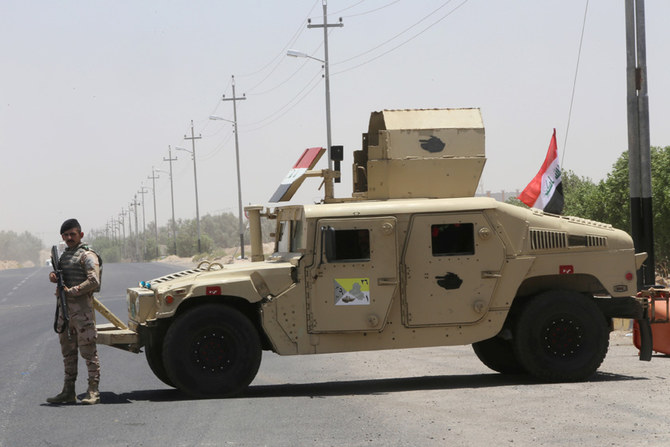BAGHDAD, Iraq: Iran was accused of sowing further chaos on Wednesday when a rocket hit a site near Basra in southern Iraq used by US and other oil companies.
The attack came hours after three rockets landed in the Rumailah oil field in Basra, near a camp used by the US oil services company Baker Hughes.
It was the fourth oil-related terrorist attack since Tehran threatened to halt exports from the Arabian Gulf in response to US sanctions aimed at reducing Iran’s oil sales to zero.
Three people were injured in Wednesday’s incident, when a short-range Katyusha rocket hit a drilling site in the Burjesiya area near Basra, an operational area for oil companies including Royal Dutch Shell, Eni of Italy and the US giant ExxonMobil.
The finger of blame was immediately pointed at Iran-backed armed groups in the area, particularly Kata’ib Hezbollah. “They are equipped with this type of rocket, which is ubiquitous among the Iranian-supported militias,” security analyst Dr. Theodore Karasik told Arab News.
TIMELINE OF TERROR
● July 21, 2018 Iran’s supreme leader Ayatollah Ali Khamenei says if Iran’s oil sales are impeded by sanctions, ‘no other country in the region will export oil either.’
● April 21, 2019 US says it will end sanctions exemptions allowing some countries to buy Iranian oil, with the aim of reducing its exports to zero.
● May 12 Four tankers — two Saudi, one Emirati and one Norwegian — are sabotaged with explosive mines off the coast of Fujairah in the UAE. ● May 14 Drone attacks on two oil pumping stations temporarily shut down pipeline from eastern Saudi Arabia to Yanbu port on the Red Sea.
● June 13 Two tankers, one Japanese and one Norwegian, are attacked in the Gulf of Oman, leaving one ablaze and both adrift.
● June 19 Rocket attack targets foreign oil installations near Basra in southern Iraq, where Iran-backed militias are active.
“The Islamic Republican Guard Corps has created a supply network for local militias that helped to build up a weapons stock around Basra. It is easily fed by new supplies from Iran because of the porous nature of the border between the two, both on land and at sea,” said Karasik, senior adviser at Gulf State Analytics in Washington, DC.
An Iraqi security source also blamed Iran-backed militias. “The team that launched the rocket is made up of more than one group and were well trained in missile launching,” he said.
The rocket was fired from farmland about 4 km away and landed 100 meters from part of the site used as a residence and operations center by Exxon. Company staff were flown to Dubai.
Abbas Maher, mayor of the nearby town of Zubair, said he believed Iran-backed groups had specifically targeted Exxon to “send a message” to the US.
“We cannot separate this from regional developments, meaning the US-Iranian conflict,” he said. “These incidents have political objectives.”
Meanwhile US investigators presented more evidence that Iran was behind last week’s tanker attacks in the Gulf of Oman.
“The limpet mine used in the attack … bears a striking resemblance to Iranian mines already publicly displayed in Iranian military parades,” said US Navy Commander Sean Kido.




























